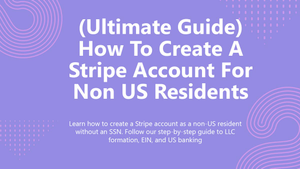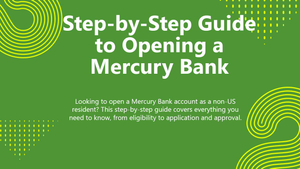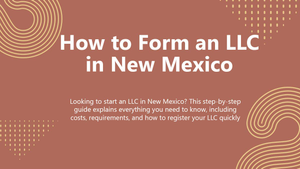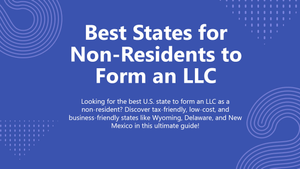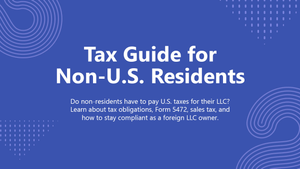LLC for Non-Residents: What It Is, How to Form One, and Key Benefits
For many entrepreneurs outside the United States, forming an LLC (Limited Liability Company) in the U.S. opens doors to a world of opportunities.
Whether you're a freelancer, an e-commerce business owner, or a startup founder, an LLC offers key advantages like access to the U.S. financial system, tax flexibility, and legal protection.
But how exactly does it work for non-residents?
Many assume that forming a company in the U.S. requires citizenship or a visa. However, non-residents can legally form an LLC in the United States, operate their business globally, and even open a U.S. business bank account—all without stepping foot in the country.
This guide will walk you through what an LLC is, why it’s beneficial for non-residents, and how to form one step by step. We will also discuss common mistakes to avoid and what to do after forming your LLC.
By the end of this guide, you will understand whether an LLC is the right choice for your business and how to leverage its advantages to expand your operations internationally.
Starting a Business in the U.S.: A General Overview for Non-Residents
For non-residents, the United States is one of the most attractive countries to form a business due to its strong economy, investor-friendly regulations, and access to global financial markets. Many international entrepreneurs look to the U.S. not only for credibility but also for practical advantages like payment processing, banking, and legal protection.
Why Do Foreign Entrepreneurs Want to Form a Company in the U.S.?
1️⃣ Access to the U.S. Market
- The U.S. is the world's largest economy, offering a vast customer base for businesses in e-commerce, SaaS, consulting, and digital services.
- Forming an LLC in the U.S. gives businesses a professional appearance, increasing trust with customers and partners.
2️⃣ Global Business Operations with a U.S. Presence
- Many non-residents don’t actually live or operate in the U.S., but having an LLC allows them to access U.S. banking, Stripe, PayPal, and other financial services that might not be available in their home country.
- An LLC provides an international gateway to operate a business remotely.
3️⃣ Legal and Financial Benefits
- U.S. laws offer strong business protection, including limited liability, which protects the owner’s personal assets.
- Forming an LLC in certain states, such as Wyoming or Delaware, allows non-residents to enjoy low compliance costs and no state income tax (if structured correctly).
4️⃣ Simplified Business Formation Process
- Compared to many other countries, forming an LLC in the U.S. is fast, cost-effective, and requires minimal paperwork.
- With the right guidance, a non-resident can form an LLC within a few days without visiting the U.S.
Tax, Legal, and Financial Benefits
✅ Tax Flexibility
- An LLC is a pass-through entity, meaning the business itself does not pay federal taxes; instead, profits are reported by the owner.
- If a non-resident operates entirely outside the U.S., they may not owe U.S. taxes at all.
✅ Easier Banking & Payment Processing
- A U.S. LLC can open business bank accounts in the U.S., allowing easier access to global payment platforms like Stripe, PayPal, and Wise.
- Many online businesses struggle with receiving payments internationally; an LLC solves this issue.
✅ Limited Liability Protection
- The owner's personal assets are separated from business liabilities, reducing financial risk in case of legal issues.
✅ Business Credibility & Growth Potential
- U.S.-registered companies are often considered more trustworthy and credible, making it easier to attract clients, investors, and partners worldwide.
What Is an LLC? What Does It Mean for Non-Residents?
For non-residents looking to establish a business presence in the U.S., a Limited Liability Company (LLC) is one of the most flexible and cost-effective business structures available. It offers a combination of legal protection, tax benefits, and operational simplicity, making it an ideal choice for foreign entrepreneurs. But what exactly is an LLC, and how does it function for non-residents?
1️⃣ Understanding the Basics: What Is an LLC?
A Limited Liability Company (LLC) is a type of business structure that provides limited liability protection to its owners (known as members), meaning their personal assets are protected from business debts and lawsuits.
Key Features of an LLC:
✅ Limited Liability Protection – The owners are not personally responsible for business debts or legal claims.
✅ Pass-Through Taxation – Profits and losses are reported on the owner’s tax return rather than taxed at the business level.
✅ Flexible Management – LLCs can be managed by the owners (member-managed) or by designated managers (manager-managed).
✅ Fewer Compliance Requirements – Unlike corporations, LLCs do not require shareholder meetings, board structures, or extensive record-keeping.
2️⃣ How Does an LLC Work for Non-Residents?
Non-residents can legally form and own an LLC in the U.S. without needing to be a U.S. citizen or even having a physical presence in the country. This makes an LLC an excellent option for international entrepreneurs, e-commerce sellers, and freelancers.
How It Differs for Non-Residents:
- Non-residents cannot have an LLC taxed as an S-Corporation (S-Corps are restricted to U.S. citizens or residents).
- An LLC owned by a non-resident is typically taxed as a pass-through entity (unless it elects to be taxed as a C-Corp).
- Non-residents may need an EIN (Employer Identification Number) and sometimes an ITIN (Individual Taxpayer Identification Number) for tax purposes.
- Having a U.S. address is not required, but a Registered Agent within the state of formation is mandatory.
3️⃣ LLC vs. Other Business Structures: Which One Is Better?
For non-residents, choosing the right business structure is crucial. Below is a comparison of LLCs, Corporations (C-Corps), and Sole Proprietorships to help decide which one best suits your business needs.
| Feature | LLC | C-Corporation | Sole Proprietorship |
|---|---|---|---|
| Limited Liability Protection | ✅ Yes | ✅ Yes | ❌ No |
| Taxation | Pass-through (default) | Double taxation (corporate & personal) | Self-employment taxes |
| Ease of Formation | ✅ Simple & quick | ❌ Complex & costly | ✅ Easiest |
| Ownership Restrictions | ✅ No restrictions | ✅ No restrictions | ❌ Single owner only |
| Best for Non-Residents? | ✅ Yes | ✅ Sometimes | ❌ No |
✅ Why an LLC Is Best for Non-Residents:
- It is the most flexible structure for foreign entrepreneurs.
- LLCs avoid corporate-level taxation, unlike C-Corps.
- It provides personal asset protection, unlike a sole proprietorship.
4️⃣ Key Benefits of an LLC for Non-Residents
✅ No U.S. Residency or Citizenship Required – Non-residents can form and operate an LLC remotely.
✅ Easier Access to U.S. Banking & Payment Gateways – An LLC enables businesses to open a U.S. business bank account and use services like Stripe, PayPal, and Wise.
✅ Limited Liability Protection – Personal assets remain separate from business risks.
✅ Tax Advantages – If structured properly, non-residents may not owe U.S. federal taxes (depending on business activities).
✅ Global Business Flexibility – LLCs are perfect for international e-commerce, SaaS, consulting, and remote businesses.
Final Thoughts
For non-residents, forming an LLC in the U.S. provides credibility, legal security, and access to financial services that may not be available in their home country. It is one of the simplest ways to expand a business internationally while benefiting from the U.S. legal system and tax advantages
Advantages of an LLC for Non-Residents
For non-residents looking to establish a business presence in the U.S., an LLC offers several significant advantages. From tax benefits to legal protection and banking access, an LLC can be a game-changer for international entrepreneurs. Below, we explore the key benefits of forming an LLC as a non-resident.
1️⃣ Tax Benefits for Non-Residents
One of the biggest advantages of forming an LLC in the U.S. as a non-resident is potential tax savings. Depending on how the LLC is structured and where the business operates, non-residents may be able to minimize or completely avoid U.S. federal taxes.
✅ Pass-Through Taxation
- By default, an LLC is a pass-through entity, meaning the company itself does not pay federal income taxes. Instead, profits and losses are reported on the owner's tax return.
- If a non-resident owner has no "effectively connected income" (ECI) in the U.S., they may not owe U.S. federal income tax.
- No double taxation, unlike C-Corporations.
✅ No Tax on Foreign-Sourced Income
- If the LLC operates entirely outside the U.S. (no U.S. employees, offices, or physical presence), its profits may not be subject to U.S. taxation.
- However, non-residents should check tax treaties between the U.S. and their home country to avoid potential tax issues.
✅ No State Income Tax in Certain States
- Some states like Wyoming and Florida have no state income tax, making them ideal for non-residents.
- Other states like Delaware have business-friendly regulations but may require some additional compliance steps.
2️⃣ Legal Protection & Limited Liability
An LLC protects your personal assets from lawsuits, business debts, and financial obligations. This is particularly important for non-residents who might not have legal representation or financial backup in the U.S.
✅ Personal Asset Protection
- If your LLC faces legal action or debt issues, your personal assets (house, savings, etc.) are protected.
- Unlike a sole proprietorship, where personal and business finances are linked, an LLC legally separates your assets.
✅ Stronger Legal Recognition
- The U.S. has one of the strongest legal frameworks for businesses, giving LLC owners security against unfair lawsuits or arbitrary business restrictions.
- Many international jurisdictions recognize U.S. LLCs, making it easier to operate worldwide.
3️⃣ Banking & Payment Processing Advantages
Many non-residents struggle to access global payment platforms like Stripe, PayPal, and Wise due to restrictions in their home countries. A U.S. LLC solves this issue by giving access to U.S. banking and payment services.
✅ Open a U.S. Business Bank Account
- A U.S. LLC allows you to open a business bank account remotely (in some cases) or by visiting the U.S.
- Many fintech banks like Mercury, Relay, and Wise offer online account opening for non-residents.
✅ Easier Access to Stripe & PayPal
- Stripe and PayPal require a U.S. business presence to process payments smoothly.
- An LLC makes it easier to receive payments from global customers and withdraw funds to an international account.
✅ Better Financial Reputation & Credit Building
- A U.S. LLC gives your business a stronger reputation, making it easier to secure international partnerships and funding.
- You can build business credit in the U.S. over time, which may help with securing loans and financial trust.
4️⃣ Global Business Flexibility
A U.S. LLC allows non-residents to run an international business with minimal restrictions. It’s especially useful for:
✅ E-commerce Businesses
- Non-residents selling on platforms like Amazon FBA, Shopify, or Etsy benefit from having a U.S. LLC.
- Many e-commerce payment gateways require a U.S. business to accept international payments.
✅ SaaS & Digital Services
- Many global clients prefer working with a U.S.-registered company due to legal and payment security.
- SaaS companies can bill in USD and use Stripe subscriptions with a U.S. LLC.
✅ Freelancers & Consultants
- A U.S. LLC provides credibility for freelancers and consultants working with international clients.
- Platforms like Upwork and Fiverr make it easier to withdraw payments with a U.S. business account.
5️⃣ Simple Formation & Maintenance
Compared to other business structures, forming an LLC is one of the simplest and most cost-effective options for non-residents.
✅ No U.S. Address Required
- You don’t need to live in the U.S. or have a physical office to form an LLC.
- A Registered Agent in the formation state handles official business correspondence.
✅ Minimal Compliance Requirements
- Unlike corporations, LLCs do not require board meetings, complex shareholder structures, or extensive paperwork.
- Simple annual reports and tax filings keep compliance manageable.
✅ Fast & Affordable Formation
- An LLC can be formed within a few days, depending on the state.
- Costs vary by state, but Wyoming, Delaware, and New Mexico are among the cheapest.
Final Thoughts
For non-residents, forming an LLC in the U.S. provides significant tax benefits, legal protection, and access to banking solutions. Whether you're an entrepreneur, freelancer, or e-commerce seller, an LLC can help you expand your business globally while maintaining financial and legal security.
How Can Non-Residents Form an LLC in the U.S.?
Forming an LLC in the U.S. as a non-resident is a straightforward process, but it requires careful planning to ensure compliance and smooth operation. Below is a step-by-step guide to forming an LLC as a non-resident, covering state selection, legal requirements, and banking setup.
1️⃣ Choosing the Right State for LLC Formation
The state where you form your LLC matters because each state has different regulations, tax policies, and costs.
✅ Best States for Non-Residents:
- Wyoming – No state income tax, strong asset protection, and low annual fees.
- Delaware – Business-friendly laws, privacy benefits, and recognized internationally.
- New Mexico – Low formation fees and no annual report requirement.
- Florida – No state income tax and easy compliance.
❌ States to Avoid:
- California – High annual fees ($800 minimum) and strict compliance requirements.
- New York – Expensive publication requirements and complex regulations.
💡 Pro Tip: If you don’t have a physical presence in the U.S., Wyoming or Delaware are the best options for forming an LLC as a non-resident.
2️⃣ Appointing a Registered Agent
A Registered Agent is a mandatory requirement for all LLCs. This is a person or company located in the state of formation that receives legal and tax documents on behalf of your LLC.
🔹 Requirements for a Registered Agent:
- Must have a physical address in the state where you form your LLC.
- Must be available during business hours to receive official documents.
🔹 Recommended Registered Agent Services:
- Northwest Registered Agent (Privacy-focused and reliable).
- Incfile (Affordable with free first-year service).
- Harbor Compliance (Comprehensive compliance solutions).
💡 Pro Tip: Some Registered Agent services also help with mail forwarding and EIN applications for non-residents.
3️⃣ Filing the Articles of Organization
The Articles of Organization (also called Certificate of Formation) is the official document that legally registers your LLC with the state.
✅ Key Information Required:
- LLC name (must be unique in the state).
- Registered Agent details.
- Member/Manager information.
- Business purpose (usually listed as "General Business").
📌 Filing Fees & Processing Times:
- Wyoming: $100 (Online filing available, processed in 1-3 days).
- Delaware: $90 (Fast processing, widely recognized).
- Florida: $125 (Quick online registration).
💡 Pro Tip: Use an LLC formation service like Northwest Registered Agent, Incfile, or ZenBusiness if you want to speed up the process and avoid paperwork mistakes.
4️⃣ Obtaining an EIN (Employer Identification Number)
An EIN (Employer Identification Number) is required to:
✅ Open a U.S. business bank account.
✅ File taxes and reports.
✅ Hire employees (if needed).
📌 How Non-Residents Can Get an EIN:
- Apply online (Only available to U.S. residents with a Social Security Number).
- Apply via Fax or Mail using Form SS-4 (Recommended for non-residents).
- Use an EIN application service (Faster but may cost extra).
💡 Pro Tip: If you don’t have a Social Security Number (SSN) or Individual Taxpayer Identification Number (ITIN), you must apply by fax or mail using Form SS-4.
5️⃣ Opening a U.S. Business Bank Account
Having a U.S. business bank account is critical for:
- Receiving payments from Stripe, PayPal, and other gateways.
- Managing business expenses and taxes efficiently.
- Building financial credibility in the U.S.
📌 Best Banks for Non-Residents:
✅ Mercury – No SSN required, easy online application.
✅ Relay Financial – Free business banking with multi-user access.
✅ Wise (formerly TransferWise) – Best for international transactions.
💡 Pro Tip: Some banks require you to visit a U.S. branch in person to open an account, but fintech banks like Mercury and Wise allow non-residents to apply online.
6️⃣ Compliance Requirements & Ongoing Maintenance
Once your LLC is formed, there are ongoing compliance requirements to keep your business legally active.
📌 Annual Requirements for LLCs:
- Annual Report Filing (Varies by state, costs range from $50-$300).
- Registered Agent Renewal (If using a service, expect ~$100 per year).
- Federal & State Tax Filings (If required based on income and business activity).
💡 Pro Tip: Failing to file your Annual Report can result in penalties or even LLC dissolution, so keep track of deadlines!
Final Thoughts
Forming an LLC as a non-resident is a strategic move for global entrepreneurs looking to access the U.S. market, establish credibility, and streamline financial operations. With the right approach, a non-resident can form an LLC in a few days and start running their business remotely.
Common Mistakes When Forming an LLC as a Non-Resident & How to Avoid Them
Forming an LLC in the U.S. as a non-resident can be a smooth process if done correctly. However, many entrepreneurs make mistakes that can lead to legal, tax, or banking issues. Below are the most common pitfalls and how to avoid them.
1️⃣ Choosing the Wrong State for LLC Formation
Many non-residents assume that forming an LLC in any state is the same, but this is not true. Some states have higher taxes, expensive fees, or unnecessary compliance requirements.
❌ Common Mistakes:
- Registering in California or New York without a physical presence (both have high fees and strict rules).
- Forming an LLC in a state with state income tax when it’s not necessary.
✅ How to Avoid It:
- Choose a state with low fees, strong privacy laws, and no state income tax.
- Best states for non-residents: Wyoming, Delaware, and Florida.
2️⃣ Not Understanding U.S. Tax Obligations
One of the biggest advantages of an LLC is potential tax savings, but misunderstanding tax rules can lead to compliance issues.
❌ Common Mistakes:
- Assuming that an LLC never pays U.S. taxes.
- Failing to file required tax documents (even if no taxes are owed).
- Not understanding “Effectively Connected Income” (ECI), which determines if income is taxable in the U.S.
✅ How to Avoid It:
- If your LLC does not have a U.S. presence (no employees, no physical office, no U.S. clients), it may not owe U.S. taxes, but you must still file an annual tax return.
- Consult a U.S. tax professional who specializes in non-resident businesses.
- File IRS Form 5472 & Form 1120 if your LLC is a Single-Member LLC (required for compliance).
3️⃣ Using a Personal Address Instead of a Registered Agent
A Registered Agent is required by law to receive official business correspondence. Some non-residents mistakenly list their personal address or a virtual office, which is not allowed.
❌ Common Mistakes:
- Trying to use a non-U.S. address for business registration.
- Using a PO Box instead of a Registered Agent’s physical address.
✅ How to Avoid It:
- Hire a Registered Agent service in the state where you form your LLC.
- Recommended services: Northwest Registered Agent, Incfile, ZenBusiness.
4️⃣ Failing to Obtain an EIN (Employer Identification Number)
An EIN (Employer Identification Number) is required to:
✅ Open a U.S. business bank account.
✅ File tax forms (if necessary).
✅ Register with payment processors like Stripe & PayPal.
❌ Common Mistakes:
- Assuming an EIN is only for businesses with employees.
- Trying to apply online without an SSN or ITIN (Non-residents must apply by fax/mail).
✅ How to Avoid It:
- Non-residents must apply for an EIN by filing IRS Form SS-4 via fax or mail.
- If unsure, use a service like IRS EIN Filing Assistance to help with the application.
5️⃣ Opening the Wrong Type of U.S. Business Bank Account
Having a U.S. business bank account is critical for receiving payments and managing finances. Some non-residents struggle with the process due to documentation issues.
❌ Common Mistakes:
- Choosing a bank that requires an in-person visit (not all banks allow remote applications).
- Not preparing the correct documents (LLC documents, EIN, and ID).
✅ How to Avoid It:
- Use fintech banks like Mercury, Relay, or Wise, which allow non-residents to open accounts remotely.
- Have your EIN, LLC formation documents, and passport ready before applying.
6️⃣ Not Keeping Up with Annual Compliance Requirements
Many non-residents forget that LLCs have ongoing compliance requirements such as:
✅ Annual Report filings (Varies by state).
✅ Maintaining a Registered Agent service.
✅ Filing IRS tax forms if required.
❌ Common Mistakes:
- Ignoring the Annual Report deadline, leading to penalties or LLC dissolution.
- Not renewing the Registered Agent service, which can make the LLC non-compliant.
✅ How to Avoid It:
- Track your state’s Annual Report deadlines and file them on time.
- Renew your Registered Agent service every year.
- Set reminders for tax form submissions to the IRS.
7️⃣ Using a Virtual Office Instead of a Physical Address for Banking
Some banks require an LLC to have a physical address, not a virtual address.
❌ Common Mistakes:
- Trying to open a U.S. bank account using a virtual office or mail forwarding service.
- Using a foreign address for bank applications, which can cause rejections.
✅ How to Avoid It:
- Use a Registered Agent address or a real physical office if needed.
- Choose banks that accept non-residents, like Mercury and Relay.
By avoiding these common mistakes, non-residents can ensure a smooth LLC formation process and avoid legal or financial issues. Proper planning and understanding U.S. regulations are key to successfully forming and maintaining an LLC.
Final Thoughts: Why an LLC Is the Best Choice for Non-Residents
Forming an LLC in the U.S. as a non-resident opens the door to global business opportunities, financial stability, and legal protection. Whether you're an entrepreneur, freelancer, or e-commerce seller, an LLC provides the flexibility to operate internationally while benefiting from the U.S. legal and financial system.
In this guide, we’ve explored:
✅ What an LLC is and why it matters for non-residents – Understanding how an LLC provides limited liability, tax flexibility, and access to U.S. markets.
✅ The key advantages of an LLC – Including tax benefits, legal protection, access to U.S. banking, and credibility for international business.
✅ How to form an LLC as a non-resident – A step-by-step guide covering state selection, Registered Agents, EIN applications, and banking setup.
✅ Common mistakes and how to avoid them – Ensuring compliance with U.S. tax regulations, annual filings, and legal requirements to keep your LLC in good standing.
For non-residents, an LLC is one of the easiest and most cost-effective ways to establish a business presence in the U.S. It allows you to operate from anywhere in the world, process international payments with ease, and protect your personal assets while scaling your business.
📌 What’s Next?
Once your LLC is formed, the next step is understanding post-formation responsibilities—managing compliance, tax reporting, and growing your business with the right financial tools. Stay tuned for the next guide on what to do after forming your LLC! 🚀
✅ Ready to Form Your LLC?
If you're serious about forming your LLC as a non-resident, consider using a trusted LLC formation service like Northwest Registered Agent to streamline the process and avoid costly mistakes
